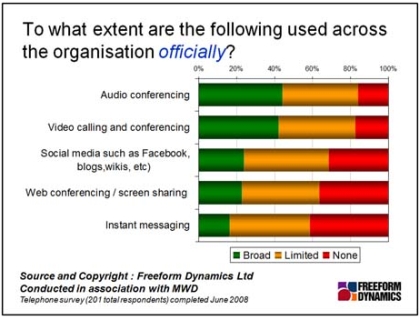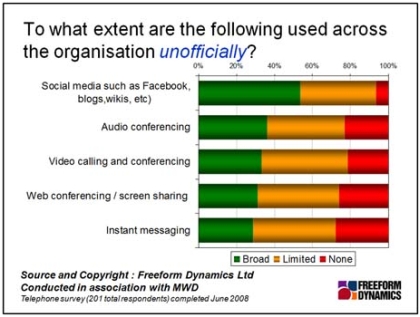Sometimes it’s good to see what’s going on inside other companies. It might make you feel you’re not alone. Or maybe it alerts you to stuff that’s going on that you weren’t aware of.
Collaboration software has been getting a darned good airing over the past few years and, to listen to the enthusiasts, it’s this massive new wave that’s crashing over businesses and transforming them in hitherto unforseen ways.
And, in a few cases, it’s true. I’ve recently written elsewhere about GE (General Electric Company) and Wachovia Bank (just being largely taken over by Citigroup as a result of the recent turmoil). Links here and here. Both companies have put a lot of effort into building collaboration software systems. The sort of effort that smaller businesses could only dream of. If we wanted to collaborate, we’d have to use readily-available software or online services.
Recently Freeform Dynamics (disclosure: which buys most of my time) and Macehiter Ward-Dutton did some telephone research to investigate the take-up of collaborative software inside large European organisations. (From 1000 employees upwards.) I realise this is a bit off your patch, but I think you might find some of the results of two particular questions quite interesting.
The first one related to the popularity of officially sanctioned social software. The second related to the take up of the same software unofficially.
You can see that the relative popularity of the various tools is identical, with one exception. The new social media stuff shoots from third to first place in the ‘unofficial use’ chart. And the difference in the ‘broad adoption’ versus ‘partial adoption’ is particularly marked. It does suggest that many staff yearn for this sort of thing and, if the company doesn’t provide it, then they will sign up for it themselves.
This presents multiple dangers. At one level, you can end up with a rag bag of incompatible software and services. At the recent Office 2.0 conference, ‘tool fragmentation’ came up frequently as a theme. At another level, you have no idea what’s going on in your own organisation. If challenged by a regulator, say, would you be able to provide a comprehensive account of your dealings with a particular client? Probably not. It would either be lost in the ether or require a huge amount of expensive digging.
One of the things that GE and Wachovia realised is that real corporate value emerges from collaboration as long as it is business-focused. This is why they unashamedly put it behind the firewall, even though outsiders (business partners and the like) can be invited to participate. In their systems everyone is accountable, nothing is anonymous and everything is stored in perpetuity. If it sounds a bit strong-arm, it’s not really. Users are given the freedom to communicate, coalesce into communities and share information. For the so-called knowledge workers, it acts as a lubricant to their activities.
Whether social software will be right for you depends on the nature of your business. If you have people scattered but having to sustain contact and share information regularly, then it is highly likely you’d benefit. If you have people working as individuals or in non-information roles, then the benefits will be low to non-existent.
Best to keep your ear to the ground and if you find people using Facebook, wikis, blogs and the like in the course of their working day, get them to explain how they see these things benefit the business. If it makes sense, check out the many business-focused and professional offerings and switch social collaboration from skunk works to official policy.
Through our research and insights, we help bridge the gap between technology buyers and sellers.





Have You Read This?
Generative AI Checkpoint
From Barcode Scanning to Smart Data Capture
Beyond the Barcode: Smart Data Capture
The Evolving Role of Converged Infrastructure in Modern IT
Evaluating the Potential of Hyper-Converged Storage
Kubernetes as an enterprise multi-cloud enabler
A CX perspective on the Contact Centre
Automation of SAP Master Data Management